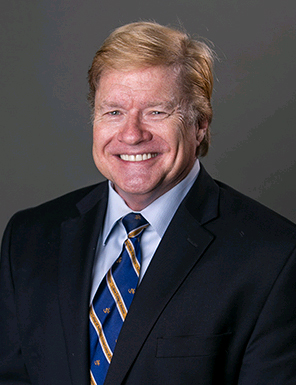Body Language and the Job Hunt

Stanley Ridgley stands up straight from his desk chair, shoulders back, chest out with his hands extended up and out in a gesture of victory. “I feel especially powerful today!” he exclaims in a clear, unwavering voice.
This, explains Ridgley, PhD, assistant clinical professor of management in the LeBow College of Business, is what we should practice in our bathroom mirrors before heading out for a job interview.
Scientists differ on the exact number, but it’s been estimated that up to 75% of all communication is conducted non-verbally. Since job interviews and networking events rely heavily on first impressions, understanding the subtleties of body language can come in handy.
Ridgley, who approximates that he watches some 300 individual presentations and 75 group presentations a year, is adept at deciphering body language.
“Confidence. Power. Surety. You want to communicate that you are the type of person your employer would like to work with,” he says.
According to him, some people are naturally inclined to communicate confidently, while others must practice at it. Either way, he advocates that we start paying attention not only to the words that we say, but how we look, sound and feel while we say them.
Communicate confidence
You want to “exude authenticity and comfortableness,” says Ridgley, an aura that can be communicated before you even speak a word.
- Practice things such as your posture and your handshake before heading into a high-risk situation, such as a job interview. That way, positive and powerful non-verbal cues are simply part of your arsenal instead of another thing to think about.
- “Take up space. Often, you’ll see people trying to make themselves smaller, trying not to get in other people’s space. But we make ourselves feel miserable when we make ourselves smaller,” he says. Keep this in mind before your interview even starts. For instance, don’t slump and stare at the floor while you’re waiting in the reception area.
- During an interview (or any conversation), avoid sitting with slouched shoulders or crossed arms—a non-verbal barrier between you and the interviewer.
- Communicate interest by very slightly leaning towards the interviewer, making appropriate eye contact. If you’re inclined to talk with your hands, make crisp, sharp gestures that add meaning.
- “Visualize victory; picture yourself knocking it out of the park,” says Ridgley. To a certain extent, you can control your emotions. If your notice yourself exhibiting signals of nervousness (shaky-voice, hair twirling, fidgeting, etc), make it a habit to convince yourself that you will succeed. Once you believe it, you will communicate this confidence to others automatically.
“Consciously adopt a strong pose associated with confidence rather than allow negative emotions to control your body’s posture. In this way, we can increase our confidence at a time when it’s needed most. Metaphorically, it’s like generating our own positive energy.”
The easiest way to win over an interviewer? A simple smile works wonders.
Check out Dr. Ridgley’s website, www.ihatepresentations.com, for more tips on effective communication.
